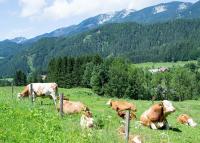
After European lawmakers reached an agreement on the reform of the EU’s Common Agricultural Policy (CAP) in June, EU countries were asked to develop national strategic plans before the end of the year. However, according to Gertrud Grabmann, chairwoman of the association Bio Austria, “the current proposals for the new ÖPUL (Austria’s agri-environmental programme) would mean a step backwards and weaken organic farming in Austria.”
The country’s agriculture ministry had already presented a proposal of the national plan last November, which was followed by a public consultation in May 2021. According to this first draft, the ÖPUL programme – which also regulates the support for environmental measures and rural development via the CAP’s second pillar – will be reformed. But the new plan no longer includes a separate scheme that compensates farms for the additional costs of complying with EU organic regulation, as was the case under the CAP’s previous programming period. Instead, farms will be rewarded for their environmentally friendly practices through general measures that are also available to conventional farmers.
For Bio Austria, the country’s plans “do not do justice to the systemic additional services of organic agriculture”. The association demands a separate measure to promote organic farming.
Organic farming achievement under threat
Austria is among the EU countries with the highest share of organic farms per capita as 23% of all its farms are organic and cover more than a quarter of the total agricultural area. This means Austria has already achieved the EU target set by the Commission’s flagship Farm to Fork and Biodiversity strategies, which calls on member states to have 25% of their land dedicated to organic farming.
“With the proposals on the table, we would not be able to increase the share (…) in Austria”, was written in a working paper published in April by various associations “There would even be a serious risk that we would lose many farms that have already converted to organic farming”. According to the associations, livestock farms are particularly at risk because they have to finance stable conversions or additional animal welfare costs.
Strengthening Austria’s ‘success model’
But Agriculture Minister Elisabeth Köstinger believes the CAP reform, together with the national plans, will strengthen the Austrian “success model”, which she sees as characterised by small farms, high ecological standards and a pioneering role in organic farming. “The new CAP period secures the Austrian path of sustainable agriculture,” Köstinger said in June about the recent CAP agreement, adding that it is no coincidence that Austria is the organic world champion and the delicatessen of Europe.
At the moment, about 44% of the funds from the Austrian agri-environmental programme of the second pillar go to organic farms. In March, the ministry also presented a “Future Strategy for Organic Agriculture 2030” to strengthen the demand and production of organic products.
Source: Euractiv



